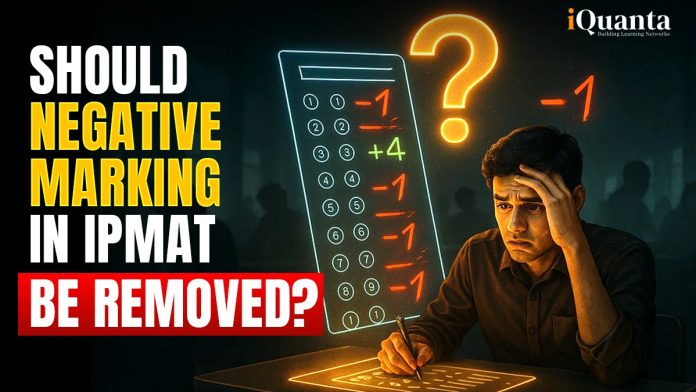The IPMAT is the Integrated Program in Management Aptitude Test and a highly competitive entrance exam which is conducted by the IIM Indore and IIM Rohtak for the admission in the 5 year Integrated Program in Management (IPM). Every year there are thousands of students aiming to secure a seat, making the exam pattern as well as the IPMAT marking scheme very important to understand. One of the important debates regarding the IPMAT exam pattern is its negative marking where students lost marks for marking the incorrect answers. Whereas the negative marking in the IPMAT exam is about maintaining fairness and discourage guesswork completely. As many students feel it adds unnecessary pressure and affects the overall performance.
In this blog, we will be talking about should negative marking in IPMAT be removed, current IPMAT marking scheme, impact of negative marking in IPMAT preparation strategy and more.
Join this free IPMAT preparation group to get free study material, strategies by toppers and experts, latest updates and more

What is the current IPMAT Marking Scheme?
The IIM Indore (Indian Institute of Management Indore) conducts the IPMAT Indore exam to shortlist students for their 5 years IPM program. The IPMAT Indore exam follows a structured marking scheme that tests both accuracy as well as speed of a candidate. It covers three sections- Quantitative Ability (MCQ), Quantitative Ability (Short Answer) as well as Verbal Ability with a total of 90 questions. Each correct answer carries +4 marks whereas the deduction of 1 marks if any student marked answer incorrect and Short Answer carries no negative marking. Understanding the IPMAT marking scheme is very important for the effective preparation strategy.
The table mentioned below is the IPMAT marking scheme for IIM Indore.
| Section | Question Type | Total Questions | Marks per Correct Answer | Negative Marking |
| Quantitative Ability (MCQ) | Multiple Choice Questions | 30 | 4 | -1 |
| Quantitative Ability (Short Answer) | Non-MCQ (Short Answer) | 15 | 4 | No |
| Verbal Ability (MCQ) | Multiple Choice Questions | 45 | 4 | -1 |
Why Negative Marking in IPMAT was Introduced?
Negative marking in the IPMAT exam was introduced by IIMs to ensure fairness as well as to maintain the quality of selection. The IPMAT exam is highly competitive and the presence of negative marking in the exam helps prevent students from random guessing of answers so that they will increase their attempt count. This rewards accuracy for the students over blind attempts as well as an important quality which is expected from the future management leaders.
There is another reason for introducing the negative marking in the IPMAT exam is to keep the difficulty level balanced and filter out well prepared students. When students already know that incorrect answers will reduce their marks, then they tend to attempt only the questions in which they are more confident about. This tends to be a more accurate evaluation of their actual knowledge, decision making skills as well as logical ability which is important for the 5-year Integrated Program in Management (IPM).
Should Negative Marking in IPMAT Be Removed?
There has been a debate among students on whether negative marking in the IPMAT should be removed. The negative marking in IPMAT helps maintain exam accuracy by removing random guessing but many students believe that it increases pressure and limits their question attempts especially when it is time consuming and tricky. Removing negative marking could encourage candidates to attempt more questions and take well calculated risks. The concept of negative marking in IPMAT overall increases fairness and accuracy. Therefore removing negative marking in IPMAT requires a careful consideration of both exam’s quality standard as well as student’s well being. The most preferred answer is no.
Impact of Negative Marking in IPMAT Preparation Strategy
Negative marking in the IPMAT exam covers how students plan their preparation and the way they will attempt questions during the exam. This makes accuracy level just as important as speed while shaping the overall behavior.
- Negative marking scheme in IPMAT encourages students to focus more on accuracy level over guesswork.
Reduces the number of risky or doubtful question attempts. - Increases the overall exam pressure and the need for strong time management skills.
- This requires practicing the elimination techniques to avoid extra negative marks while attempting wrong answers.
- Makes mock test analysis essential for improving accuracy and confidence.
Conclusion: Should Negative Marking in IPMAT Be Removed?
The negative marking in IPMAT adds pressure on students because it also plays an important role in ensuring the correct evaluation and maintaining the overall standard for the exam. This pushes the candidate’s focus towards accuracy and they will attend those questions they are more confident about, which helps them identify well prepared students. Removing negative marking in IPMAT might make it less stressful and not very serious for many students because it could lead to the increase in scores due to random guessing.
Removing negative marking in IPMAT is always a point of serious consideration related to the exam standards and the well being of a candidate. It is better that students should build their proper preparation plan around the existing IPMAT marking scheme to improve speed, accuracy, way to select questions smartly that leads to loss of less marks and time management to minimize the risk of losing marks due to incorrect attempts.
If you are looking for a structured preparation for IPMAT along with 24×7 doubt solving, then you can go for iQuanta’s IPMAT Course





